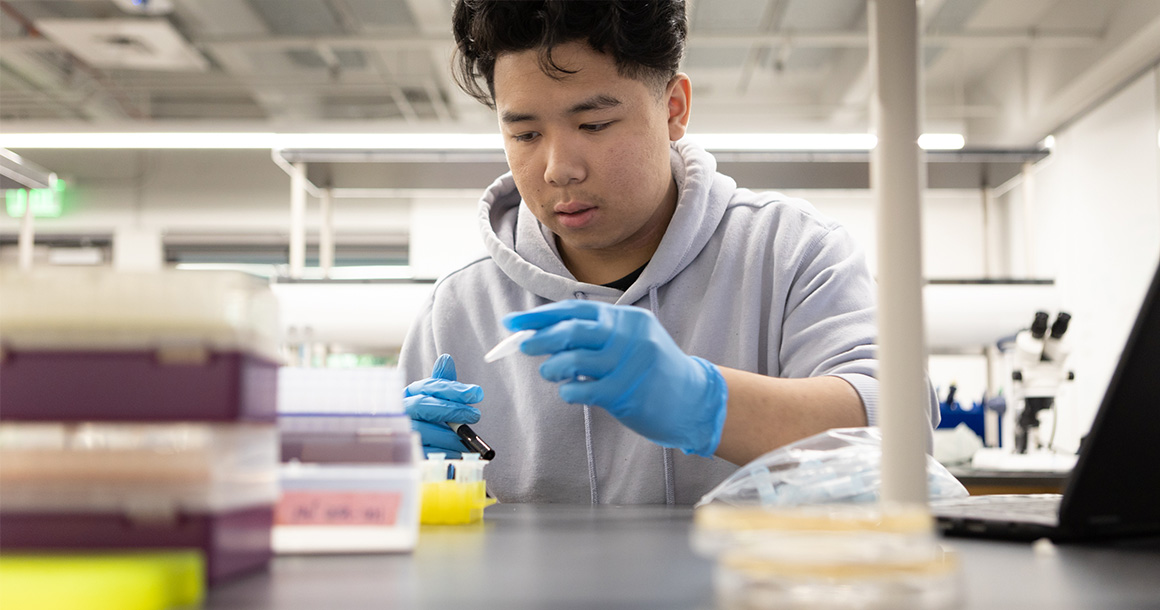College Receives Climate Justice, STEM Education Grant
Oct 7, 2024Bellevue College recently received a $500,000 grant from the National Science Foundation to continue its efforts to address climate change and improve STEM education using a social justice framework in the classroom.

Bellevue College recently received a $500,000 grant from the National Science Foundation to continue its efforts to address climate change and improve STEM education using a social justice framework in the classroom.
The grant is a continuation from a previous $300,000 grant from the foundation, and will run through September 2027.
The grant is through the foundation’s new Innovation in Two-Year College STEM Education program, which is in its first year and was created specifically for community colleges. The program was created as a subprogram under the foundation’s larger Improving Undergraduate STEM Education program, which is where Bellevue College’s previous foundation grant was awarded. That program is open to all colleges and universities.
“A very low percent of those grants were awarded to community colleges,” Sonya Remington Doucette, principal investigator on the grant, said about the Improving Undergraduate STEM Education grant. “It’s much harder to apply for one of these from a community college. We got really lucky.”
Doucette, who has been a chemistry and environmental science professor at Bellevue College for 11 years, is overseeing the project alongside her co-investigator Heather Price, a chemistry professor at North Seattle College. She said, while Bellevue College may be listed as the primary institution on the project, it is a full collaboration with North Seattle College.
Both grants are being used for integrating climate justice and civic engagement into the curriculum of every course, across all subjects, and for faculty professional development
“We’re supporting faculty to creatively develop these new ways of teaching while still meeting the course objectives,” Doucette said.
Equitable and meaningful STEM
Doucette said they have three objectives for this project. The first is to further develop this type of teaching—centered on civic engagement that is meaningful and manageable for students and faculty at community colleges. The second objective is to bring systems thinking to chemistry so students can see why what they’re learning matters and how they can apply it to real life.
“Chemistry education, as it is right now, is very abstract for students. It seems very disconnected from the real world for most students—especially the 100-level courses,” Doucette said. “So what we’re trying to do is connect it to real-world systems, to teach it in the context of real-world systems. Some place or time where there’s a climate justice issue, there are people experiencing this issue and there’s chemistry involved: The water is polluted because of fracking, or, you know, all sorts of things.”
She added that teaching in this way, within the context of social justice issues, is known as “the equity ethic” and it helps engage students who are typically marginalized in STEM. Students who can see the social relevance of STEM are more likely to stay in a STEM major and end up in a STEM career. When STEM is taught in the context of a social justice issue, students can see how it can be used to help their communities.
Doucette said that this grant and the work they are doing has positioned Bellevue College and North Seattle College as leaders in higher education when it comes to reforming STEM education, noting how certain groups have historically felt excluded from STEM fields, as leaders have historically been white men. This was something she felt when she was getting her doctorate as a woman in a male-dominated program with no female faculty when she started.
“We’re leaders not only in the community college world, but in the entire world of higher education,” Doucette said. “Because we’ve got groups that are based in four-year colleges and universities interested in what we’re doing.”
Expanding to other campuses
The final objective of this project is sharing the curriculum with other schools. The money from the previous grant, which the college received in February 2021, went toward paying stipends for faculty at Bellevue College and North Seattle College who participated in professional development. And now, as Doucette and Price have presented at conferences and other institutions have learned about their work, more schools want to get involved. So they are taking their curriculum and sharing it with other institutions—so they can implement it on their campuses.
Doucette said community colleges throughout Washington—17 out of the 34 schools across the state—have already utilized their curriculum. This part of the project was funded by the Washington State Board of Community and Technical Colleges from the state legislature.
The next step of the project is working with schools in Oregon and California, which is funded through the National Science Foundation grant. Doucette said the extra funding is needed because there are so many moving pieces at a college and you can run into many barriers, anticipated or not. The pair is working with Dendros Group, a consulting firm that specializes in institutional change, to ensure their curriculum is more readily usable for others.
“We’re expanding to Oregon and California. We’re working with Portland Community College and Central Oregon Community College in Oregon, and we’re working with Fullerton College in Orange County in California,” Doucette said. “They’re all community colleges.”
Interested in learning about climate justice through STEM education? Check out Bellevue College’s STEM pathway and see what the college’s Office of Sustainability is doing to support climate action and education. You can also view the climate justice curricula created by 30 different Bellevue College and other faculty in the Curriculum for the Bioregion Activity Collection.
